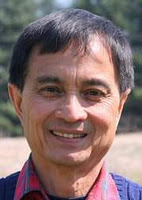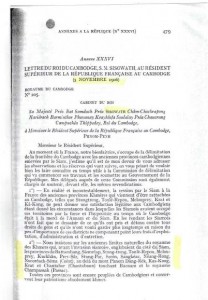Researches
now browsing by category
Cambodia needs to see real change
Thank you very much Dr. Peang-Met for raising up this very important controversial debate. In Cambodia as people have been embedded by non-independent mass media including the unalienable traumatic past of war and genocide, the group of stability and stomach need, has been conveyed by majority. However, Buddhists who have learned and experienced deep understanding of the teachings see that the highest goal of Buddhism is “liberty”, not “the four necessities”. In practice, Nama (liberty) and Rupa (four necessities) must be equal and in balance.In Vipassana meditation, practitioners cannot get into the Dhamma stream if one cannot balance Nama and Rupa. Socially and politically observing, Cambodia is not in the stage of any thing identical to these three stages. Scandals of non-independent judicial system, economic development through poor evictions, non-independent mass media, rampant corruption from tops to bottoms, political autocracy, favoritism and cronyism etc. have been lingering on the murky stage…do we see Cambodia is in the pathway of engineering in development and stability, engineering in creating liberty, or engineering in balancing of both social commodities?
Many readers emailed me following my series of articles on replacing Cambodia’s dictatorship with a democratic form of government. As many emails contained similar concerns, I have grouped those with similar themes and will use this column to deal with two.
Posted in Culture, Economics, Education, Politics, Researches, Social | Comments Off on Cambodia needs to see real change
Tags: A. Gaffar Peang-Meth, Cambodia
Non-violence struggle on the footstep of Mahatma Ghandi
All Koun Khmers must watch this video clip. It is a struggle of non-violence by prominent leaders such as Ghandi and Luther King. Non-violence is a struggle against the Leviathans whose political culture is using power and violence. Non-violence means to counter-strike but counter-strike by using the mean of non-violence.
Clarification on the film “Bringing Down A Dictator”: The film was not the work of Popovic’s Center for Applied Action and Strategies (CANVAS), but the work of a small, independent company in Washington, D.C., with funding from the International Center on Nonviolent Conflict. The film, translated into about a dozen languages, has a broad impact on nonviolent movements in the past decade. On the work of the company producing the film, log on to www.aForceMorePowerful.org. Two segments of “A Force More Powerful” have been translated into Khmer and the company has downloaded them to YouTube at http://www.youtube.com/watch?v=DV_rdWsl9To&feature=plcp&context=C3674762UDOEgsToPDskIkoecUwF0ukf5qw-6qu_ve
Readers are urged to see the film in Khmer.
Gaffar Peang-Meth
Posted in Culture, Economics, Education, Researches, Social | Comments Off on Non-violence struggle on the footstep of Mahatma Ghandi
Tags: Mahatma Ghandi, Non-violence
Letter (5 November 1906) from the King of Cambodia, H.M. King Sisowath to France
This document is historically and remarkably marvelous for all Koun Khmers to read and conceptualize it. It is a letter by King Sisowath to King Napoleon III to intervene the matter of border encroachment by Siam and Annam. We don’t really understand the whole story that by this letter, French protested the Siam to return back all provinces controlled by Siem to Cambodia. But at least, by the affair of colonialism to delineating its territory and the intellectual crusading for territorial independence of King Sisowath, Cambodia has been maintained its current map and national identity to the world that this greatest kingdom in the past has still remained its heritage and identity….cheer to French and Cambodian nationalist leaders!
Letter (5 November 1906) from the King of Cambodia, H.M. King Sisowath to France
(Source: International Court to Justice, 1962a, Case Concerning the Temple of Preah Vihear. Pleadings, oral arguments, documents. The Hague)
Yours, Bora Touch
………………………
Unoficial translation
Letter from the King of Cambodia, H.M. Sisowath,
to the French Colonial Governor in Cambodia
Kingdom of Cambodia
No. 205
Office of the King
H.M. Preah Bat Samdech Preah SISOWATH Cham-Chakrapong Hakrireach Barminthor Phuvanay Kraykeofa Soulalay Preah Chao Krong Kampuchea Thippadey, King of Cambodia
To the Governor of the French Republic in Cambodia,
Phnom Penh
Mr. Governor,
At a time when France, our benefactor, is busy with the delimitation of the border of Cambodia with the former Cambodian provinces abducted by Siam, I believe that it is my duty to send you the following observations and reservations, and I am also asking you to please let these be known, at an opportune time, to the delimitation Commission which will start its works and submit them to the Government of the (French) Republic. My delegates within this Commission are also in charge of supporting the same demands in front of the Commission.
Posted in Culture, Education, Politics, Researches, Social | Comments Off on Letter (5 November 1906) from the King of Cambodia, H.M. King Sisowath to France
Tags: Annam, French protectorate, King Sisowath, Siam
Lessons for toppling dictators
Lessons for toppling dictators
A. Gaffar Peang-Meth
PACIFIC DAILY NEWS
Popovic tells us we need analytical skills in “unity, planning, and nonviolent discipline” to succeed in a revolution. He tells us of the working of the dynamics of enthusiasm and humor vs. fear and apathy: As enthusiasm and humor go up, fear and apathy go down, and vice versa. And he tells us to select strategy and tactics: Start small and pick the battle one can win.
 I ended 2011 with a column on Lord Buddha’s teachings from 2,500 years ago about man as an activist, an “actionist,” and a maker of the world. As 95 percent of Cambodia’s 14 million people identify themselves as Buddhist, I deduced that Cambodians are activists and “actionists” who can transform autocratic Cambodia into a Buddhist country of civil rights, justice, and compassion.
I ended 2011 with a column on Lord Buddha’s teachings from 2,500 years ago about man as an activist, an “actionist,” and a maker of the world. As 95 percent of Cambodia’s 14 million people identify themselves as Buddhist, I deduced that Cambodians are activists and “actionists” who can transform autocratic Cambodia into a Buddhist country of civil rights, justice, and compassion.Posted in Culture, Education, Politics, Researches, Social | Comments Off on Lessons for toppling dictators
Tags: A. Gaffar Peang-Meth, Buddha, Dictator, Non-violence, Revolutionist













